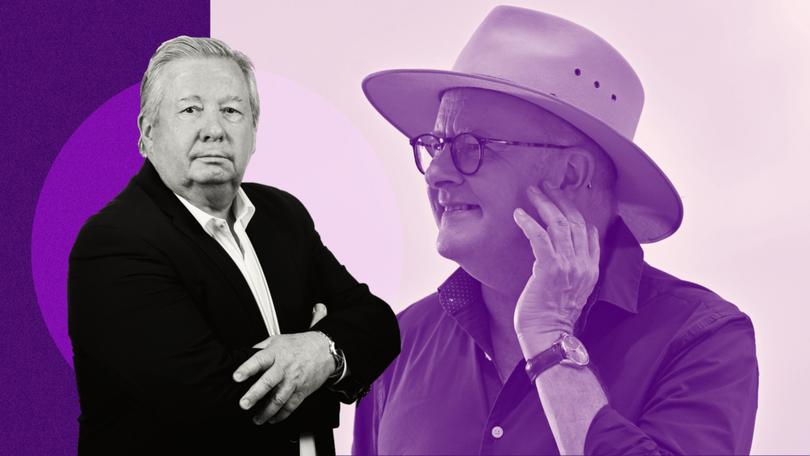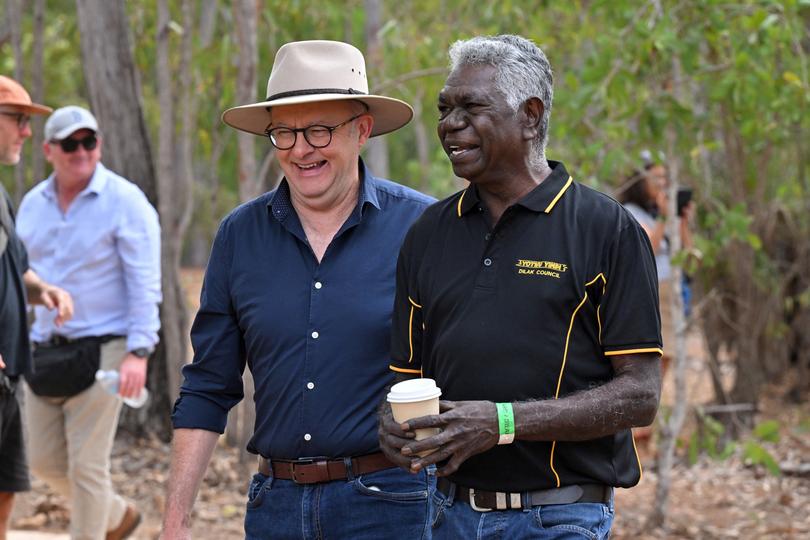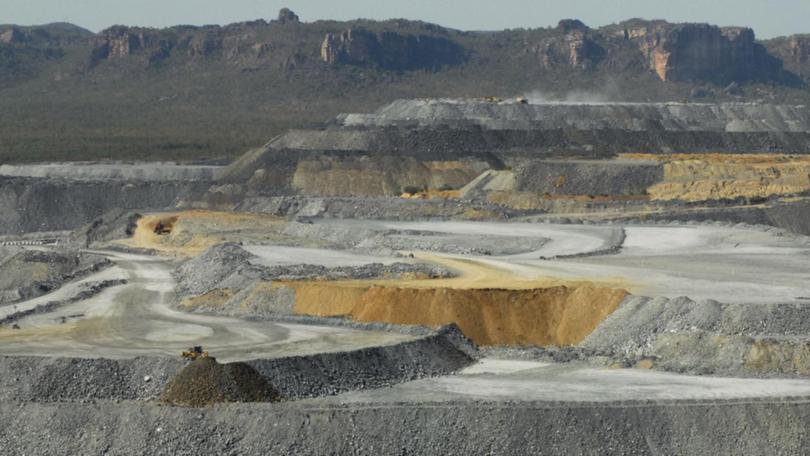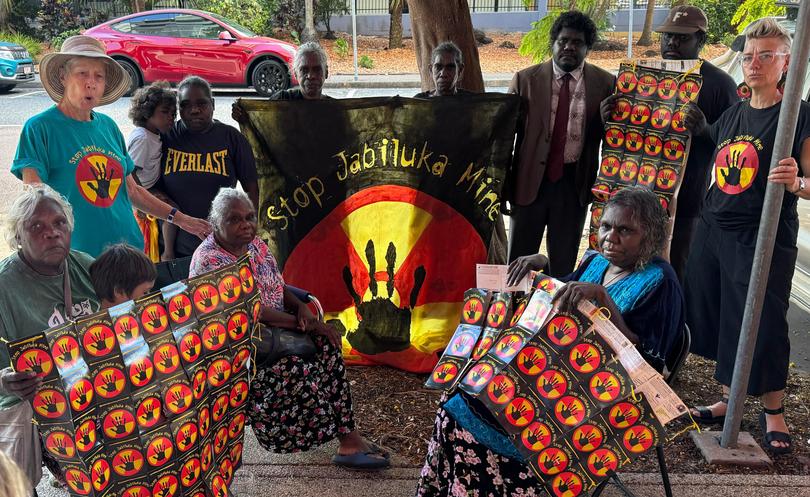PAUL MURRAY: More weasel words from Anthony Albanese won’t cover the fact he broke his promise
PAUL MURRAY: The Prime Minister’s weasel words won't hide the fact that he has backtracked on a key Indigenous pledge — and nuked uranium mining plans to try and cover himself.

In the aftermath of the crushing defeat of his disastrous Voice referendum, Prime Minister Anthony Albanese again ventured to the Indigenous Garma Festival in the Northern Territory last week armed with very little but regrets.
And a few more hollow promises.
This time, Albanese dangled in front of the Arnhem Land gathering a new Indigenous future based on “growing global demand for renewable energy, critical minerals and rare earths”.
Sign up to The Nightly's newsletters.
Get the first look at the digital newspaper, curated daily stories and breaking headlines delivered to your inbox.
By continuing you agree to our Terms and Privacy Policy.NB: Those critical minerals and rare earths don’t include uranium. More on that later.
“New clean energy projects, new defence and security projects, new processing and refining facilities can all unlock new jobs and prosperity for Indigenous communities,” the Prime Minister said in his speech last Saturday.
Better than offering another tokenistic referendum, I guess.
But he also took to Garma a bitter pill that he wasn’t quite prepared to make them swallow while he was there.
In an interview aired on the ABC’s Insiders program the next day, but recorded at Garma, he walked away from his historic election night commitment to a national body to oversee agreement-making between Indigenous people and governments.
He made no mention of it in his speech. The hypocrisy of what he did say — a transcript of which is strangely absent from his website, unlike his 2022 and 2023 words — is stunning.
Albanese avoided telling the Garma crowd what he was prepared to tell David Speers on Insiders: He was no longer committed to the Uluru Statement “in full”.
Instead of owning up, he revisited his speech the previous year and an exchange with Djawa Yunupingu, chair of the Yothu Yindi Foundation, which hosts Garma.
“Afterwards, when I stepped from this stage, Yunupingu sitting over here, shook my hand, looked me in the eye and with the voice of someone to whom words had been broken so many times before, he asked me very clearly just three words: ‘Are you serious?’,” he said.
“And I said: ‘Yes we are going to do it.’ And that was the only guarantee I could offer.”

While Albanese lost the referendum and therefore the first part of his promise to deliver the Voice, there is no legal or legislative impediment stopping him from pursuing the other parts of his promise.
The Garma crowd knew the Uluru Statement contained an explicit demand for “a Makarrata Commission to supervise a process of agreement-making between governments and First Nations”.
And they know what Makarrata means — for a lot longer than him — and that his new insistence on a literal interpretation of it, just “coming together after a struggle”, were weasel words.
The co-chairs of the Uluru dialogue, Megan Davis and Pat Anderson, stayed away from Garma this year, but later called out Albanese’s deceptive ploy.
“Makarrata is not a vague vibe or a series of casual conversations,” the co-chairs said after the Insiders appearance.
He had the gall to talk about broken promises and about looking people in the eye.
“The Makarrata called for in the Uluru Statement is a bricks-and-mortar body and it was a clear election promise.”
Even the ABC’s very pro-Labor presenter Patricia Karvelas was astounded at Albanese’s chutzpah for playing word games over the Uluru Statement.
“It calls for a Makarrata Commission and a process of agreement-making and truth-telling — and the Albanese Government had already allocated $5.8 million towards its establishment,” she wrote on the ABC website.
Karvelas stopped short of calling Albanese a liar. But that’s what he is.
Even worse, he had the gall to talk about broken promises and about looking people in the eye. Then he didn’t look them in the eye — and broke his promise.
But, knowing he was ditching the Makarrata Commission, Albanese had tried to smooth the way at Garma with a breathtakingly audacious intervention.
He chose the NSW Labor Party State conference the weekend before to announce that the longstanding lease over the Jabiluka uranium deposit in the Northern Territory — the best in Australia — would be ended.
“There will never be mining at Jabiluka,” Albanese told the NSW delegates, who had no direct interest in the matter. Just an ideological one
But it soon became clear the PM had told the NT Labor Government to end the lease, up for normal renewal on Sunday. They jointly intend to lock it up in the surrounding Kakadu National Park.

“The Federal Government advice, along with the wishes of the Mirarr people, were critical to this process and outcome,” NT Mining Minister Mark Monaghan said, ineptly exposing Canberra’s political intervention to possible future legal probing.
Rio Tinto-controlled Energy Resources Australia, which has held the lease since 1991, on Thursday began legal action against the Commonwealth and the NT Government over the decision.
“ERA believes it had a right to have its renewal application lawfully determined and considers it was denied procedural fairness and natural justice in the decision-making process,” the company said.
When the Mirarr applied for native title over the Kakadu area in 2004, they said there were just 25 members of the clan.
Tony Grey, the former head of Pancontinental Mining, which discovered the deposit, negotiated the original lease with the head of the Northern Land Council, Galarrwuy Yunupingu, acting on behalf of the Mirarr. It was signed by Toby Gangale, the Mirarr’s chief traditional owner.
“I can say with complete certainty that the Mirarr people and the NLC, including Mr Yunupingu, were happy with the agreement and the social benefits that would flow from it,” Grey wrote last week in the Australian Financial Review.
However, since then, the Mirarr appear to have shifted and now oppose mining, although there is no evidence it has been put to a vote. That may become a central issue if the ERA action goes to trial.

Grey says even if the Mirarr had a valid veto over mining, there was no reason for the Albanese Government to intervene. Other, of course, than the tawdry politics at play.
There are now said to be 37 Mirrar, who in 2021 were given the closed Ranger mine’s Jabiru township by the Morrison Coalition government, along with $35m for improvements. Their Gundjeihmi Aboriginal Corporation employs 50 staff.
Caught in the middle of the mess is Perth fund manager Willy Packer, whose $2 billion Investigator Trust has an $80m investment in ERA, making it the biggest minority shareholder at 9.3 per cent.
In a letter to the ERA board, Packer noted the company had raised over $1.3b since 2011 to fund rehabilitation of the adjoining Ranger open pit mine knowing the Jabiluka lease remained “in good standing” and that a 10-year lease renewal would be forthcoming.
That spending has built up huge corporate tax losses — and they may be what this is all about. Remember that.
Why would anyone in business trust Albanese after his intervention? This is the worst sort of socialism.
“Jabiluka is arguably the world’s best uranium deposit with resources in the ground worth over $50b,” Packer wrote. “What’s more, if approved, Jabiluka would have minimal environmental impact being an underground mine, in contrast to the historic open pit mines at Ranger.
“The world needs clean energy whether that be in the form of wind turbines or nuclear power plants and in that regard, Jabiluka would provide the critical uranium fuel to power 1 per cent of the world’s energy grid with carbon-free electricity for the next 30 years.
“All the while, significant financial and social benefits would flow to the local communities, the Mirarr traditional owners, and the Australian Government.
“The development of Jabiluka is clearly in the national interest.”
But that appears to have been over-ridden by the interests of just 37 individuals — and the political sensitivities of a bruised Labor Government heading to an election.
Why would anyone in business trust Albanese after his intervention? This is the worst sort of socialism.
But it’s even worse than the state effectively confiscating a private asset. It’s the way it was done and the indications it was driven by race-based politics.
If Albanese intended to strip ERA shareholders of their long-standing asset, it required a proper, open process. The offer of just compensation would be a starting point.
ERA’s interlocutory injunction and application for a judicial review is under way in the Federal Court, full of political dangers, with the judge already finding the company has an arguable case to retain the lease.
The case might expose Labor’s relationship with mining giant Rio Tinto — which funded the Voice referendum Yes vote to the tune of $2m — and Rio’s dog-in-the-manger approach to the lease cancellation.
Rio shareholders can question why the previous $4b-plus value of their 86 per cent share of ERA has been destroyed without demur from the board.
Is this a tax write-off rort for a multinational consortium that wants out of uranium for commercial and political reasons, already bruised by the backlash to its Juukan Gorge debacle?
And with the Liberals pushing a pro-nuclear strategy, Rio’s concurrence suits hypocritical Albanese’s political needs just fine.
